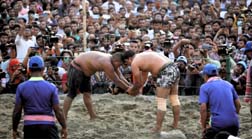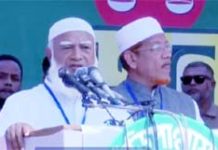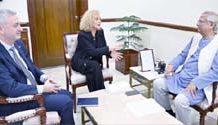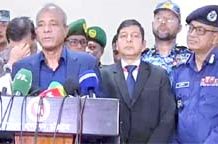C T Online Desk: People around Bangladesh have always felt passionate about sports. May it be cheering for the Bangladesh Cricket Team even when the wickets keep falling off or hanging a foreign country flag on rooftops due to the Fifa World Cup. The enthusiasm regarding different sports was always present among Bangladeshis for centuries but the situation looked a little different back in the past. The sport wasn’t Cricket or Football, but our very own Boli Khela.
On April 25, the Jabbarer Boli Khela will once again take place on the grounds of Laldighi Maidan, marking its 115th edition alongside the traditional Boishakhi Mela.
Boli Khela, a form of traditional wrestling, holds a special place as Chittagong’s district sport. While every Chittagonian is familiar with Boli Khela, the rich history behind this traditional sport remains unknown to the majority.
Yasin Makki, who came from Mecca, to spread Islam, began residing at Madarsha union in Satkania Upazila of Chittagong, around 250–300 years ago. Yasin began preaching and running a business in the neighborhood. He used to take many Bangladeshis to Saudi Arabia for Hajj, earning the area the title of “Mokkar Bari”.
He died shortly after during one Hajj Season. However, his family continued his line of Zamindari. Yasin Makki’s grandson, Kader Bokshu, came up with the idea in 1889 to amuse his subjects while collecting rent, and it was named the Mokkar Boli Khela after his death. He used to plant a massive tree in front of the house at the start of the game. Those who came to pay the rent and those who could lift the tree were allowed to participate in the sport.
Later, in the early 20th century, Abdul Jabbar Saodagor started arranging Boli Khela. His motivations differed significantly from mere enthusiasm or entertainment. Instead, his vision was deeply rooted in a sense of societal responsibility and resistance against British rule. The sport sparked widespread interest after the end of World War I.
In the present day, almost no Chittagonian would say Boli Khela without saying Jabbar first. What began as a means of self-defense has evolved into a competitive sport now. Held alongside the Boishaki Mela, the Mokkar Boli Khela occurs on the 7th of Boishakh at Madarsa Union, while the Jabbarer Boli Khela takes place on 11-13th (24-26th April) at Laldighi Maidan. Additionally, Sorkarer Boli Khela takes place on the 4th at Tailardip, Anwara.
Boli Khela is a full-contact combat sport in which fighters use clinching, throwing, joint locking, pinning holds, and a variety of other grappling tactics. A match is played on a dirt-surfaced circular or square field. For competitions, players wear simply a pair of shorts and no shoes or other equipment. The goal of the sport is to compel any portion of the opponent’s body, except the feet, to touch the ground, like in most other kinds of wrestling.
The etymology behind the sports name is as such: Boli denotes a wrestler or a powerful person, whereas Khela denotes a game, in Bengali. Thus, Boli Khela translates to the game of the powerful.
With the older generation, the love for the festivities around Boli Khela was unmatched. Families and friends would gather to visit the Mela, cheering along with the massive crowd and enjoying the excitement of the occasion. Women from Anowara used to have a condition in their Kabeen Nama (marriage papers) requiring their husbands to take them to visit the Shorkarer Boli Khela on the 4th of Boishakh, which really goes on to show the cultural significance.
As the younger generation, many of us have only caught glimpses of the vibrant tradition of Boli Khela through our grandparents. Sadly, as we’ve grown up, the tradition seems to have faded into obscurity. The once buzzing Boishakhi Mela and exciting Boli Khela have become distant memories for many of us.
It’s a sentiment echoed by almost everyone: “It’s not the same anymore.” Despite the continuation of Boli Khela, the enthusiasm, particularly in urban areas, has noticeably waned. Instead of eagerly cheering on the players, we find ourselves complaining about the traffic caused by the festival instead. In our pursuit of modernity and excessive options of entertainment, we have lost love for what is our very own and are looking for it in things that don’t really belong to us.
However, one of the upsides of growing up is the opportunity to make our own choices. So, why not set aside a day to visit Laldighi Maidan with our friends and family? Or, if distance or the scorching heat makes it challenging, why not gather around the TV and cheer together? Perhaps by doing so, we can help rekindle some of the love and excitement for Boli Khela, for the years to come.














